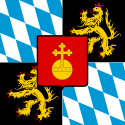Electorate of Bavaria
Electorate of Bavaria Kurfürstentum Bayern (German) | |||||||||
|---|---|---|---|---|---|---|---|---|---|
| 1623–1806 | |||||||||
Maximilian IV Joseph, Elector of Bavaria | |||||||||
| Historical era | Electorate of the Palatinate | 1777 | |||||||
• Raised to kingdom | 1806 | ||||||||
| |||||||||
The Electorate of Bavaria (German: Kurfürstentum Bayern) was a quasi-independent hereditary electorate of the Holy Roman Empire from 1623 to 1806, when it was succeeded by the Kingdom of Bavaria.[2]
The
Geography
The Electorate of Bavaria consisted of most of the modern regions of
Dignities
By virtue of his electoral title, the Elector of Bavaria was a member of the Council of Electors in the
History
Thirty Years' War
When he had succeeded to the throne of the Duchy of Bavaria in 1597, Maximilian I had found it encumbered with debt and filled with disorder, but ten years of his vigorous rule effected a remarkable change. The finances and the judicial system were reorganised, a class of civil servants and a national militia founded, and several small districts were brought under the duke's authority. The result was a unity and order in the duchy which enabled Maximilian to play an important part in the Thirty Years' War; during the earlier years of which he was so successful as to acquire the Upper Palatinate and the electoral dignity which had been enjoyed since 1356 by the elder branch of the Wittelsbach family. In spite of subsequent reverses, Maximilian retained these gains at the Peace of Westphalia in 1648. During the later years of this war Bavaria, especially the northern part, suffered severely. In 1632 the Swedes invaded, and when Maximilian violated the Treaty of Ulm in 1647, the French and the Swedes ravaged the land. After repairing this damage to some extent, the elector died at Ingolstadt in September 1651, leaving his state much stronger than he had found it. The addition of the Upper Palatinate made Bavaria compact; the acquisition of the electoral vote made it influential; and the electorate was able to play a part in European politics which internal strife had rendered impossible for the past four hundred years.
Absolutism


Whatever lustre the international position won by Maximilian I might add to the electoral house, on Bavaria itself its effect during the next two centuries was more dubious. Maximilian's son, Ferdinand Maria (1651–1679), who was a minor when he succeeded, did much indeed to repair the wounds caused by the Thirty Years' War, encouraging agriculture and industries, and building or restoring numerous churches and monasteries. In 1669, moreover, he again called a meeting of the diet, which had been suspended since 1612.
His constructive work, however, was largely undone by his son
Untaught by Maximilian II Emmanuel's experience, his son,
Palatinate-Bavaria

So great an accession of strength to a neighbouring state, whose ambition she had so recently had just reason to fear, proved intolerable to Austria, which laid claim to a number of lordships —forming one-third of the whole Bavarian inheritance – as lapsed fiefs of the Bohemian, Austrian, and imperial crowns. These were at once occupied by Austrian troops, with the secret consent of Charles Theodore himself, who was without legitimate heirs, and wished to obtain from the emperor the elevation of his natural children to the status of princes of the Empire. The protests of the next heir,
For Bavaria itself Charles Theodore did less than nothing. He felt himself a foreigner among foreigners, and his favourite scheme, the subject of endless intrigues with the Austrian cabinet and the immediate cause of
Revolutionary and Napoleonic periods

In 1792 the
In view of the scarcely disguised ambitions and intrigues of the Austrian court, Montgelas now believed that the interests of Bavaria lay in a frank alliance with the
In 1803, accordingly, in the
End of the Electorate of Bavaria
In September 1805, Bavaria signed the Bogenhausen Treaty with France. The primary consequence of the treaty was Bavaria's military support for Napoleon. Bavarian troops under General Karl Philipp von Wrede fought the Austrians at Iglau in Bohemia, which contributed to the simultaneous French victory at Austerlitz on 2 December 1805.
In the
The electorate existed until 1806, when Bavaria was proclaimed a kingdom. It had its origins in the Franco-Bavarian Treaty of Brno of 10–12 December 1805 and in the Peace of Pressburg on 26 December 1805 between the plenipotentiaries of the French Emperor Napoleon Bonaparte and the Holy Roman and Austrian Emperor Francis II & I concluded a peace treaty, because Austria now had to cede the counties of Tyrol and Vorarlberg to Bavaria. Duke and Elector Maximilian IV Joseph was proclaimed King Maximilian I Joseph on 1 January 1806 in Munich as the first king of Bavaria. From 1 January 1806, the Bavarian royal title initially read:
"By the grace of God, King of Bavaria, Archpalatine Count of the Holy Roman Empire, Archtruchsess and Elector."
The formal exit of Bavaria from the Holy Roman Empire, renouncing the electoral dignity, did not take place until July 1806 with the Rheinbund Act. The new king still served as an elector until Bavaria left the Holy Roman Empire (1 August 1806). On 15 March 1806 Max Joseph had ceded the Duchy of Berg to Napoleon. Shortly thereafter, the Confederation of the Rhine was formed and Maximilian Joseph, with the other princes who joined that body, announced his secession from the Holy Roman Empire. On 6 August 1806, the Holy Roman Empire was dissolved after surviving for a thousand years.
See also
References
- ^ Based on original preserved depictions:
-
The catholic Church of St. Johann Baptist in Oberviechtach
-
The catholic Church of the Visitation of the Virgin Mary in Gottmannshofen
-
- ]


![Coat of arms[1] (1623–1777) of Bavaria](http://upload.wikimedia.org/wikipedia/commons/thumb/6/65/Coat_of_Arms_of_the_Electorate_of_Bavaria_1753.svg/105px-Coat_of_Arms_of_the_Electorate_of_Bavaria_1753.svg.png)



